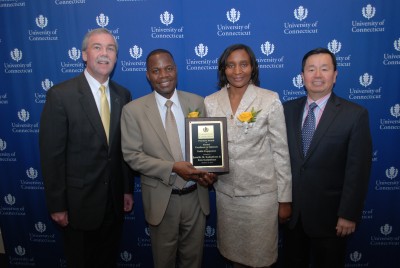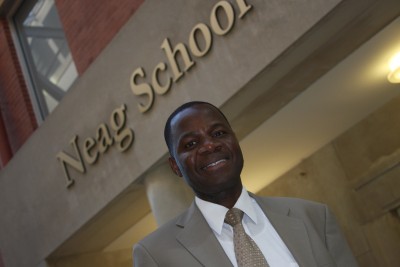In the United States, children typically begin formal education once they turn five or six years old, but this is not always the norm in other countries. Zato Kadambaya, a Neag School of Education alum, started first grade when he was 11 years old. Born in Togo — a small West African nation where children are needed to work on family farms, schools are located far from homes and education is not a priority — Kadambaya was fortunate to have a mother who supported his desire to learn.
“Once I started school, I realized I was very good at it,” Kadambaya explains. “I did very well and started to realize I could do better for myself than my parents did.”
Unlike most students in Togo, who finish school and then return to the farm, Kadambaya decided to go to college and continue his education in the United States. In 1990, he took the Togo national exam for college, scored the first in the nation with high distinction and received a scholarship to attend Central State University in Ohio as a manufacturing engineering student. There, he met his future wife, Leonille.
After graduating from Central State, he and Leonille moved to Connecticut to attend graduate schools at UConn. While his wife received a degree to teach special education from Neag, Kadambaya received his master of science in Electrical Engineering. Upon graduation, he took what he learned back to Togo to work as an electrical engineer, but quickly realized he wasn’t happy. Among other things, he saw there the great need for Togo people—and all people—to receive better education. Inspired by that, he returned to UConn and the Neag School of Education to become a certified teacher through Neag’s Teaching Certification Program for College Graduates. “I believe education is the key to everything,” Kadambaya says simply.
Excelling and scoring four out of four in the BEST evaluation program used at the time, Kadambaya is currently the head of the math department at Norwich Free Academy. He will soon be moving to the New London school district to become the math and science coordinator and STEM (science, technology, engineering, math) administrator at New London High School.

Since becoming an educator, his awards have included the Norwich Branch NAACP Excellence in Education Award, the Connecticut General Assembly Official Citation, the City of Norwich Public Proclamation, and the Outstanding Alumni Award from CCSU Educational Leadership. Recently, he and Leonille were also recognized with the UConn Provost’s Awards for Excellence in Public Engagement, alumni category.
Currently, Kadambaya says his favorite grade to teach is 9th, because students are still young and not yet too set in their ways. “The transition from middle to high school is a very important one,” says Kadambaya, “and if you can make that transition easy and successful, it’s very rewarding.”
He also enjoys getting to watch his students graduate, and to see how much they have changed. His future plans include returning to Togo, where he will use his education and experience to not just teach students, but to train other quality teachers—something he believes Neag well-prepared him for: “Neag gave me many opportunities, and I really appreciate everything I learned here. I now work to pass on all that and more, because when people aren’t educated, everything else passes by.”
When asked what advice he would give to aspiring teachers, Kadambaya stressed the importance of young people first and foremost taking care of themselves: “You must be healthy and strong-minded to help students,” he says. “You can’t make a difference for your students if you are stressed out.” Teaching is also a profession you must grow into, he added: “Your second year will be better than your first and so on and so forth.”



